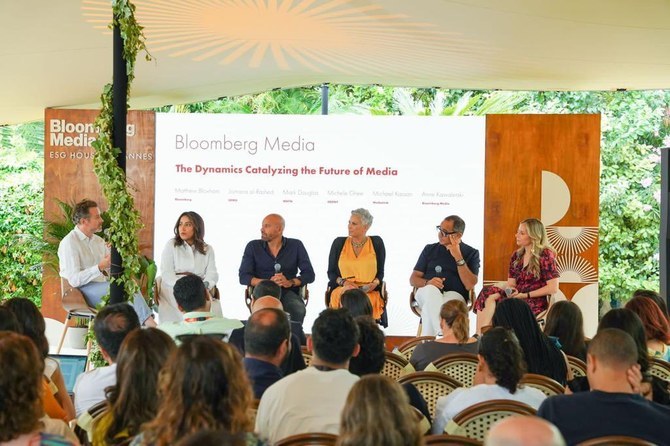CANNES: The Saudi Research and Media Group (SRMG) concluded its participation in the Cannes Lions Festival for International Creativity on Thursday with an impressive night of art and music and panels on digital well-being and connectivity.
SRMG partnered with the region’s leading music platform, Anghami, to organize a special night called ‘MENA Night’ which was attended by many talents, creators, media experts and award winners of the Festival.
“Celebrating the creative talents who represented the MENA region at the Cannes Lions Festival is a unique opportunity to showcase their incredible talent and innovation to the world,” said Jomana Al-Rashid, CEO of SRMG.
“At SRMG, we are delighted to host the talents that represented the MENA region at the Cannes Lions Festival, and as one of the most respected and largest media groups in the Middle East, we always, and will continue to, embrace the best and brightest talent from the region and the world.”
Various rising stars from the Middle East attended the event, including Bird Pearson, Lush and Samee’ Lamee’ from Saudi music entertainment company ‘Middle Beast.’
Guests also had an exclusive look at NFT artworks from regional artists and creators including Faisal Al-Khuraiji, Alaa Balkhi, Amr Boughari and Rex Chouk.
The show was organized by Nuqta, the first collaborative, mobile and web app, which invites the public to post images of Arabic calligraphy and typography as they experience it anywhere.
The media powerhouse hosted a series of interactive panel discussions and a virtual experience in a dedicated pavilion at the festival throughout the week.
Al-Rashid outlined SRMG’s digital transformation strategy and its vision to upgrade from one of the largest and most influential media groups in the MENA region into an integrated global media giant.
In one panel moderated by Haifa Al-Jedea, managing director of SRMG Think, the media group hosted Larissa May, founder and executive director of #HalfTheStory, in conversation with Abdullah Al-Rashid, founder of Sync Summit and director at Ithra.
The panel discussed the importance of raising awareness of the negative impacts of 24/7 connectivity on our health and well-being.
The panelists called on digital platforms to prioritize the digital well-being of young people by incorporating ethical design principles.
May said that the role of #HalfTheStory is to empower the next generation of consumers to “thrive online and in life,” and to set boundaries for their digital use.
“We often don’t step back and notice how our devices have infiltrated our lives — especially those of us who work in the media industry,” she added.
Meanwhile, Abdullah Al-Rashid said that Saudis are among the world’s top users of YouTube, Snapchat and Twitter in some metrics. He asked guests: “The majority of our population are connected all the time and have only ever experienced that way of life. What does that mean for them?”
In another panel, Riad Hamade, director of business news at Asharq Business with Bloomberg, a subsidiary of SRMG, was joined by Rebecca Bezzina, SVP and managing director at R/GA London; Per Pedersen, founder and global creative chairman of by The Network; and Laurent Thevenet, head of creative technology at Publicis Groupe APAC and MEA.
The panel explored how technology is creating new ways to tell stories and disrupt the communications industry.
SRMG, one of the largest media and publishing groups in the Middle East, owns more than 30 major media outlets in the region, including Arab News, Asharq Al-Awsat, Asharq News and Sayidaty.




































